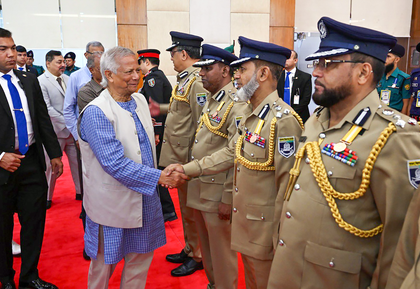Bangladesh's military under siege: Islamist purge alarms entire region
By IANS | Updated: October 16, 2025 20:10 IST2025-10-16T20:08:10+5:302025-10-16T20:10:13+5:30
Dhaka: Bangladesh is facing an unprecedented constitutional and security crisis. The interim regime led by Muhammad Yunus is now ...

Bangladesh's military under siege: Islamist purge alarms entire region
Dhaka: Bangladesh is facing an unprecedented constitutional and security crisis. The interim regime led by Muhammad Yunus is now being accused of orchestrating a systematic purge of the armed forces as part of a broader Islamist-jihadist agenda. Warranted arrests against senior officers, political targetting of military leadership, and open attempts to shift power into the hands of religious hardliners indicate that Bangladesh may be hurtling toward a theocratic state unless decisive checks and balances are restored.
In recent days, arrest warrants have been issued against 25 serving and retired military officers - including Generals - accused of "crimes against humanity". Some have already been reassigned to peripheral cantonments; others await prosecution. Reports indicate that the list may expand to include as many as 150 officers, potentially spanning the heads of the Army, Navy, and Air Force. Behind this legal purge lies what critics call a scheme to replace the professional military with an ideologically driven "Islamic Revolutionary Army" - essentially transforming Bangladesh into an Islamist republic.
What is especially alarming is the muted response from the military's upper echelons. Army Chief General Waker Uz Zaman and senior commanders have remained publicly silent - a contrast to their usual posture. Sources in defence circles suggest internal fear and deep uncertainty. In parallel, regime-aligned propagandists and Islamist activists are unleashing relentless campaigns to delegitimise the armed forces and portray them as corrupt, anti-Islam, or tied to foreign conspiracies.
The Islamist-jihadist axis in Bangladesh has deep roots. Since the violent political upheaval of August 2024, Bangladesh has become a fertile ground for Islamist movements. Local franchises of Al Qaeda and ISIS have grown increasingly visible; Hizb ut-Tahrir has staged public mobilizations; and the Jamaat-e-Islami is expanding its grassroots influence - including inside Rohingya relief camps. Pakistani intelligence (ISI) is reportedly coordinating through NGOs and Jamaat-linked networks, creating cross-border conduits of support and recruitment. Similar reports highlight Turkish Islamist influence in Bangladesh, potentially complicating regional security dynamics.
Alarm bells are already ringing. The US Embassy in Dhaka's Baridhara diplomatic zone has ramped up security in response to credible intelligence of impending jihadist attacks. Meanwhile, the regime is allegedly preparing to scrap the constitution and declare itself a "revolutionary" government - enabling Yunus to dismiss the president and military leaders and indict larger numbers of officers. Scheduled trials for the 25 accused officers begin October 22, with many facing possible capital punishment.
This development is no regional matter alone. US strategic inattention has long allowed Pakistan’s ISI to operate through Islamist proxies, only to see these networks betray American interests later. Today’s Bangladesh is becoming the next incubator. The Tsyin Erdogan–Islamist axis is reportedly entering deep into Bangladesh via funding and logistical channels. If unchecked, this alliance may reshape South Asia’s strategic balance.
Domestically, the regime is methodically hollowing out institutions. The Directorate General of Forces Intelligence (DGFI) and other security agencies are under siege - their reputations undermined, key officials indicted, and autonomy threatened. This campaign appears to be a prelude to creating a parallel Islamist-controlled security force, akin to Iran's Islamic Revolutionary Guard Corps (IRGC).
At the same time, the regime is waging a narrative war. A sophisticated information operation seeks to depict security agencies as autocratic, un-Islamic, and corrupt, while elevating Islamist actors to heroic defenders. Social media, sympathetic media outlets, and foreign platforms are complicit in amplifying this propaganda.
If the campaign is allowed to succeed, Bangladesh will cease to be a constitutional democracy. Instead, it will become a controlled theocracy with a militarised Islamist elite ruling through fear. The implications for India, Myanmar, and the broader region are deeply troubling: a radical Islamist Bangladesh aligned with Turkey and Pakistan, operating as a hub for jihadi networks.
In this moment of existential peril, regional powers - especially India and the United States - need to take a clear stand. They must publicly threaten sanctions, withhold security assistance, and demand the halting of judicial purges, reinstatement of neutral command structures, and protection of constitutional order. Silence is no longer an option; acquiescence would amount to complicity.
Bangladesh’s army - long a symbol of national sovereignty - is at a crossroads. It must choose between surrendering to ideological subjugation or reclaiming its role as guardian of the nation’s independence and secular foundation. The world must watch, but more importantly, act.
(The writer is an award-winning journalist and Editor of Dhaka-based media outlet Blitz. He specializes in counterterrorism and regional geopolitics. Views expressed are personal)
Disclaimer: This post has been auto-published from an agency feed without any modifications to the text and has not been reviewed by an editor
Open in app